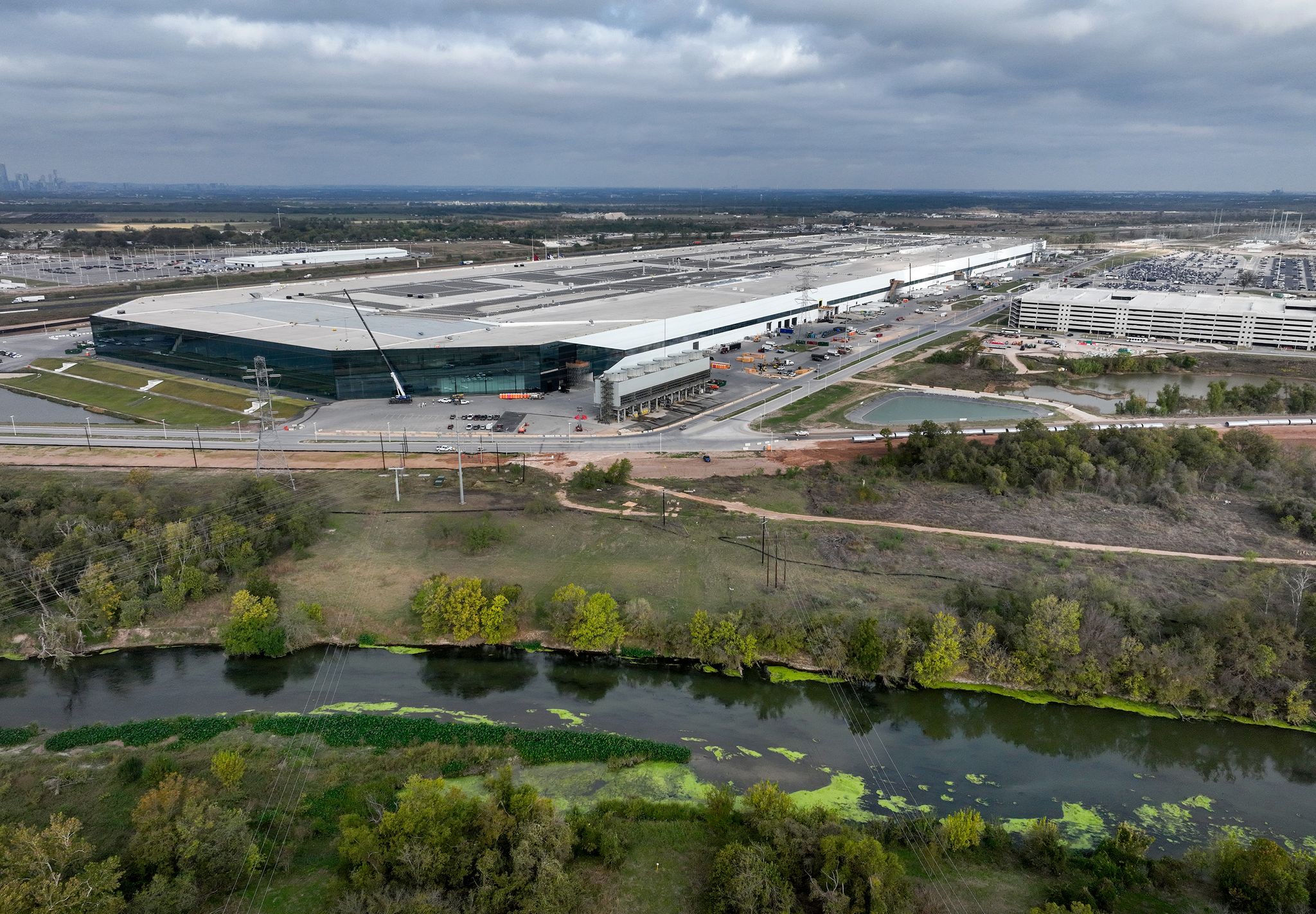business
Tesla Withholds Data as Travis County Reviews Tax Rebate
County officials say Tesla is blocking key records needed to verify a 2020 tax incentive deal for its Austin Gigafactory.
Published November 17, 2025 at 5:50pm by Dante Motley

Work is underway at the Tesla Giga Texas factory in Austin on Monday, Nov. 17, 2025.
Tesla is withholding key information from Travis County regarding its tax incentive deal, leaving officials and residents unsure if the company is eligible to receive a multi-million dollar rebate, according to County Commissioner Margaret Gomez.
County staff are currently conducting a review of a 2020 contract with Tesla that granted the company 20 years of tax rebates on its Gigafactory in eastern Travis County. Gómez told the American-Statesman that the company has been trying to “wiggle out of” the contract’s requirements by not providing specific information the county needs to verify whether Tesla has met the terms of the deal.
“We keep our staff tied to those negotiations, and we're not achieving anything,” said Gomez, who abstained from the commissioners court vote on the contract. “They don't have this, they don't have that. Well, a company like that should be good at keeping records and telling you exactly what they've achieved.”
If Tesla only invests the minimum required, the rebates would total roughly $14 million over the first decade. But the deal scales upward, refunding up to 80% of county property taxes if Tesla’s investment exceeds $2 billion. No tax dollars will be issued to Tesla until the review process is complete.
In exchange, the company is required to hit a series of benchmarks including employing at least 3,800 full-time workers — half of them Travis County residents — at a minimum wage of $15 per hour with benefits, and to make annual community investments.
The contract requires Tesla to certify its compliance by providing the county with documentation showing it is meeting the agreement.
Gomez expressed frustration with Tesla, saying she doesn't have patience for the company not meeting the court's terms.
"I don't see any progress in it," Gomez said. "That's why I'm very impatient about having staff spend time to negotiate. What they mean by negotiating is Tesla is going to work out the problem that they have with the terms in another way. But no, there's a contract. You knew what the contract was. You know. I don't have any patience for that."
The contract also includes more vague requirements like being “environmentally conscientious” during construction and complying with “all federal, state and local laws, rules and regulations, ordinances and orders.”
Amanda Marzullo, an attorney and candidate for county commissioner in Precinct Two, said she was “horrified” by how loose some of the contract terms are, calling them “unenforceable." She believes that Tesla is violating those vague terms of the contract, citing fines Tesla has received by federal and state agencies, the Texas Commission of Environmental Quality (TCEQ) and the Occupational Safety and Health Administration (OSHA), for violating the law.
Marzullo also pointed to a 2024 Wall Street Journal report that found Tesla’s Austin factory had improperly released pollutants, disposed of untreated wastewater and violated state emissions limits, which she believes would violate the environmental clauses of the agreement.
Tesla did not immediately respond to a request for comment.
Marzullo said the deal is one of the main reasons she was inspired to run for the court. She said it is not unusual for compliance reviews to be treated as negotiations where parties find a middle ground over terms. However, because those contractual obligations are loosely defined, she thinks its too easy for Tesla to dodge the requirements and wants the county to take the deal into litigation.
“It would make more sense if the county were to say, ‘You're in breach of contract, and we can renegotiate,’” Marzullo said. “But to renegotiate with an eye towards creating a contract that's more robust.”
Marzullo is running in the Democratic primaries against Commissioner Brigid Shea, who voted for the deal with Tesla five years ago.
Shea said she views the Tesla agreement as a binding legal obligation, which is why she has pushed county staff to scrutinize the company’s compliance and consult attorneys when needed. She emphasized that no rebate has been issued to Tesla as of yet.
“We need to be certain Tesla is keeping up with their end of the deal,” Shea told the Statesman. “If contract compliance review shows that they are not, it will then be up to myself and the four other members of the commissioners court to review the legal options presented to us and determine how we will proceed.”
Marzullo has been working with the organization Tesla Takedown, a group of community activists who also believe that Tesla hasn’t met these more vague requirements and believe the opacity of this deal signals Tesla’s failures to uphold their end of the agreement.
Activists with Tesla Takedown argue the county’s concerns are part of a broader pattern of noncompliance, saying the company has failed to submit required reports, withheld information about its operations and fallen short on promises made to nearby Del Valle residents.
They point to OSHA logs showing more than 1,000 worker injuries in 2023 and to pollution and wastewater violations as evidence Tesla has breached the requirement to follow all laws.
“Travis County should not give Tesla a single cent of the taxpayers' money,” said Ethan McBride, a member of the group. “If middle class homeowners have to pay increasingly large property tax bills, then we sure as hell expect a company worth $1.3 trillion to do the same.”
The county has not announced a timeline for completing its review.

